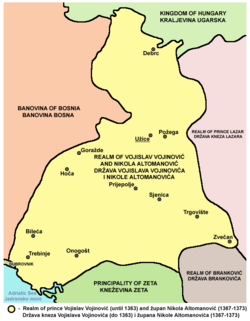This is an old revision of this page, as edited by Dejvid (talk | contribs) at 14:17, 22 August 2019 (reaching as far as). The present address (URL) is a permanent link to this revision, which may differ significantly from the current revision.
Revision as of 14:17, 22 August 2019 by Dejvid (talk | contribs) (reaching as far as)(diff) ← Previous revision | Latest revision (diff) | Newer revision → (diff)| This article needs additional citations for verification. Please help improve this article by adding citations to reliable sources. Unsourced material may be challenged and removed. Find sources: "Nikola Altomanović" – news · newspapers · books · scholar · JSTOR (June 2015) (Learn how and when to remove this message) |

Nikola Altomanović (Serbian Cyrillic: Никола Алтомановић) was a 14th-century Serbian župan of the House of Vojinović. He ruled the areas from Rudnik, over Polimlje, Podrinje, east Herzegovina with Trebinje, reaching as far as Konavle and Dračevica, neighboring the Republic of Dubrovnik. He was defeated and blinded in Užice (fortress Užice) in 1373 by a coalition of his Serbian and Bosnian royals neighbors supported by the king of Hungary.
Biography

His father was Altoman, a vojvod in Zeta. In 1363, Nikola's uncle Vojislav Vojinović was killed and Nikola used his uncle's death to gain a piece of his land. He allied himself with Lazar against King Vukašin Mrnjavčević and they managed to persuade Uroš to support them. However, after Lazar pulled out at the critical moment they were defeated at Kosovo in 1369.
In 1373, a military alliance against Nikola was created, which included Bosnian Ban Tvrtko I Kotromanić, Zetan Ruler Đurađ I Balšić, Mačvan Prince Nikola Gorjanski, and Hungarian King Ludovik I. In the same year, they battled against Nikola and Nikola lost, thus his territory was split between Prince Lazar Hrebeljanović of Serbia, Đurađ I Balšić of Zeta, and Ban Tvrtko I Kotromanić of Bosnia.
In fall of 1373, after the Serbian defeat against the Ottomans at the Battle of Maritsa he partitioned some lands with Lazar of Serbia.
| Ancestors of Nikola Altomanović | ||||||||||||||||||||||||||||||||||||||||||||||||||||||||||||||||||||||||||||||||||||||||||||||||||||||||||||||
|---|---|---|---|---|---|---|---|---|---|---|---|---|---|---|---|---|---|---|---|---|---|---|---|---|---|---|---|---|---|---|---|---|---|---|---|---|---|---|---|---|---|---|---|---|---|---|---|---|---|---|---|---|---|---|---|---|---|---|---|---|---|---|---|---|---|---|---|---|---|---|---|---|---|---|---|---|---|---|---|---|---|---|---|---|---|---|---|---|---|---|---|---|---|---|---|---|---|---|---|---|---|---|---|---|---|---|---|---|---|---|
| ||||||||||||||||||||||||||||||||||||||||||||||||||||||||||||||||||||||||||||||||||||||||||||||||||||||||||||||
References
- ^ Ćirković 2004.
- Rade Mihaljčić, Kraj srpskog carstva, p118
Sources
- Bataković, Dušan T., ed. (2005). Histoire du peuple serbe [History of the Serbian People] (in French). Lausanne: L’Age d’Homme.
{{cite book}}: Invalid|ref=harv(help) - Ćirković, Sima (2004). The Serbs. Malden: Blackwell Publishing.
{{cite book}}: Invalid|ref=harv(help) - Fine, John Van Antwerp Jr. (1994) . The Late Medieval Balkans: A Critical Survey from the Late Twelfth Century to the Ottoman Conquest. Ann Arbor, Michigan: University of Michigan Press.
{{cite book}}: Invalid|ref=harv(help)
External links
- Istorijska biblioteka: Nikola Altomanović (in Serbian)
This Serbian biographical article is a stub. You can help Misplaced Pages by expanding it. |
This Bosnia and Herzegovina biographical article is a stub. You can help Misplaced Pages by expanding it. |